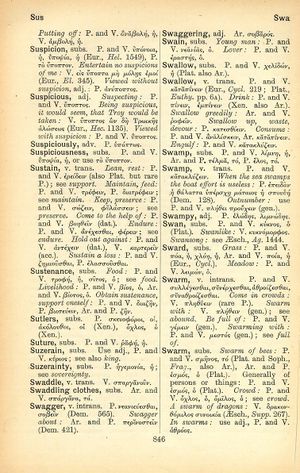swagger: Difference between revisions
From LSJ
τοῖς πράγμασιν γὰρ οὐχὶ θυμοῦσθαι χρεών· μέλει γὰρ αὐτοῖς οὐδέν· ἀλλ' οὑντυγχάνων τὰ πράγματ' ὀρθῶς ἂν τιθῇ, πράξει καλῶς → It does no good to rage at circumstance; events will take their course with no regard for us. But he who makes the best of those events he lights upon will not fare ill.
(CSV5) |
m (Woodhouse1 replacement) |
||
| Line 1: | Line 1: | ||
{{Woodhouse1 | {{Woodhouse1 | ||
|Text=[[File:woodhouse_846.jpg|thumb|link={{filepath:woodhouse_846.jpg}}]] | |Text=[[File:woodhouse_846.jpg|thumb|link={{filepath:woodhouse_846.jpg}}]] | ||
===verb intransitive=== | |||
P. νεανιεύεσθαι, σοβεῖν (Dem. 565). | [[prose|P.]] [[νεανιεύεσθαι]], [[σοβεῖν]] ([[Demosthenes|Dem.]] 565). | ||
[[swagger about]]: [[Aristophanes|Ar.]] and [[prose|P.]] [[περινοστεῖν]] ([[Demosthenes|Dem.]] 421). | |||
}} | }} | ||
Revision as of 09:00, 20 May 2020
English > Greek (Woodhouse)
verb intransitive
P. νεανιεύεσθαι, σοβεῖν (Dem. 565).
swagger about: Ar. and P. περινοστεῖν (Dem. 421).

